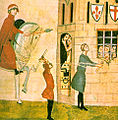Donati (family)
The Donati were a patrician family in Florence , who held great political importance for the Florentine city-state, especially in the 13th century. Through Dante Alighieri , the family related to him became literary.
history
The family belonged to the Florentine aristocracy and based their relative wealth on land in the Mugello , where their greatest enemy, the Cerchi family, which became important bankers in the 13th century , had their latifundia. The progenitor of the family is a Fiorenzo who resided in Florence from the 11th century; Donato del Pazzo is documented as the namesake of the family in 1165, his son Vinciguerra was a Console dei Militi, a commander of the city militia. Foundations from the 11th century such as the Hospital San Paolo di Pinti and important burial places in the patronage churches of the family bear witness to the early importance of the sex.
The family resided in Florentine town sixth Por San Pietro, where in the thirteenth century the wealthier, but considered to be of lower origin, Cerchi settled. The enmity of the two families split the Florentine patriciate into the parties of the 'blacks' (supporters of the Donati) and 'whites' (partisans of the Cerchi), an enmity that was fought in bloody feuds and exemplifies the war between the sexes in Tuscan city-states in the late Middle Ages has been.
The two gender towers on Corso Donati
As supporters of the Guelphs , the family had to go into exile after the victory of Ghibelline Siena over Florence 1260–1267. After their return, their importance as supporters of the Napoletan Anjou was less in view of the predominance of pope-oriented forces, but the family continued to provide communal dignitaries and also held condottiere and podestà posts in various Italian communities. Corso Donati († 1308), called Il Grande Barone, was the most famous representative of the sex as the head of the family and violent multiplier of his own and the family's influence. After his murder in 1308 the influence of his descendants declined, his sons still served Florence as officers, with the death of Giovanni di Piero Donati in 1616 the main line of the family died out. Nevertheless, Donati is still a common family name today, especially in Florence.
Dante Alighieri was born in one of the houses owned by the Donatis in 1265. Between 1283 and 1285 he married Gemma Donati, a cousin Corso Donatis. As supporters of the 'whites' party, the Donatis forced the poet into lifelong exile after its victory in 1301. In his Purgatorio , Dante lets Corso's younger brother, Forese Donati († 1296) write poetry about the opulence of Florentine women; The poet meets his sister, the nun Piccarda, who was forced by Corso to marry and thus break her nun's vows, in the Third Canto of Paradiso . Numerous other family members are mentioned in Dante's Divine Comedy .
An anecdote to which Dante alludes in the Inferno was used as the template for Puccini's one-act opera Gianni Schicchi : the arrogant and conceited relatives of the recently deceased Buoso Donati il Vecchio abandon the title character, a man of lesser origin brought in, by imitating the 'still living' Buoso draw up a forged will in their favor, with Schicchi bequeathing the best heirlooms himself.
literature
- Jan Gerchow: Donati . In: Volker Reinhardt (ed.): The great families of Italy (= Kröner's pocket edition . Volume 485). Kröner, Stuttgart 1992, ISBN 3-520-48501-X .
Individual evidence
- ↑ Dante: Purgatorio , twenty-third and twenty-fourth chants ( Streckfuß translation 1876 on Wikisource )
- ↑ Dante: Paradiso, third song ( Streckfuß translation 1876 on Wikisource )
- ↑ Dante: Inferno, thirtieth song, verse 31 ff. ( Streckfuß translation 1876 on Wikisource )
- ^ Rudolf Kloiber , Wulf Konold , Robert Maschka: Handbook of the Opera. 9th, expanded, revised edition. Bärenreiter / dtv, Kassel u. a. / Munich 2002, ISBN 3-7618-1605-7




